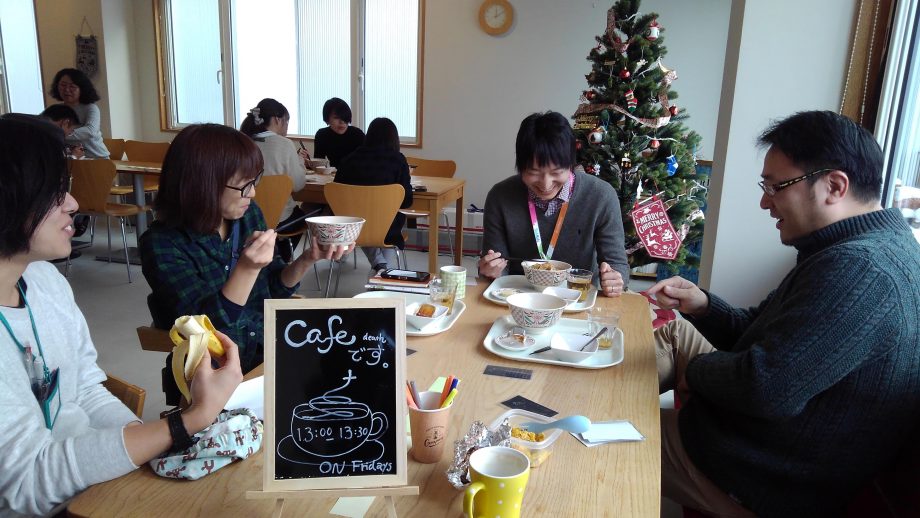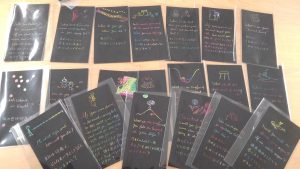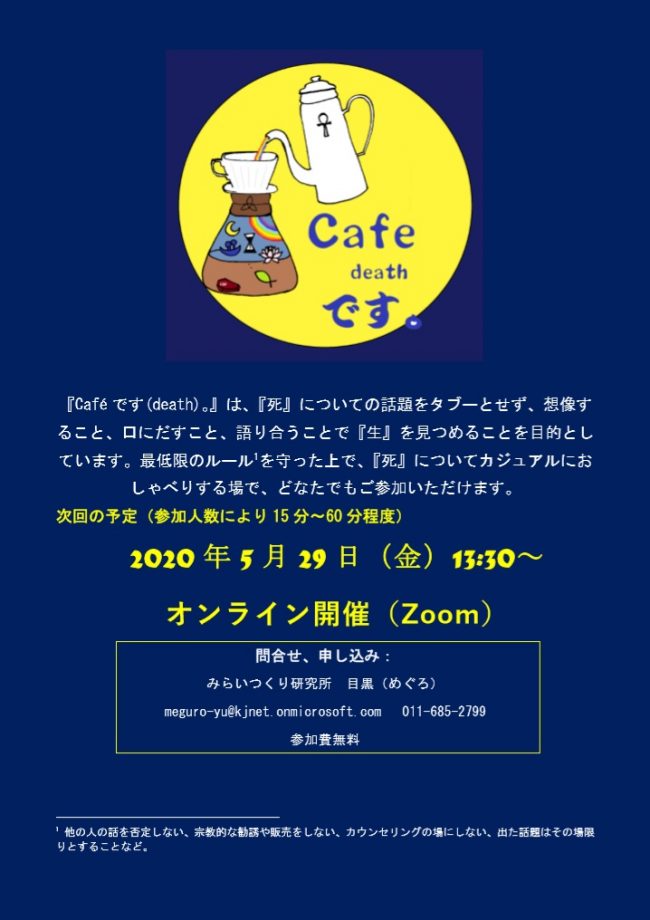『Cafeです。death』
―” 今日の献立を話すように、死について語れる場 ”づくりを目指して―
Café desu. – A safe space to talk about DEATH, DYING and LOSS casually
『あなたにとって、死の色は?』
what colour best describe DEATH for you?
「以前、家族が亡くなったときは、真っ黒でした。でも、だんだんと月日がたって、その人が遺してくれたことを大切に生きたいと思うようになって。そうしたら、今その質問を受けたら、あ、パステルカラーだって。気がつきました。」
「私は、自分の死は金色。神様と、先に天国に行った人と会えるから。でも、クリスチャンじゃない家族の死を思うと、つらくて冷たい灰色のイメージ。悲しくて、辛くなる。」
「私は、紫かな。亡くなったあの人が病院で寝ていた時の顔色。」
“It used to be BLACK since my brother had died. However, as time goes by, I gradually become able to think about him without sharp pain, feeling grateful what he had shown us through his life. Having asked this question, I just realized that now I imagine light softer colours for describing his death. Perhaps I can talk about him more.”
“For me, the colour for my own death is GOLD, warm, bright, shining gold, because I can see God and re-unite with people who had gone to the heaven earlier. On the other hand, when I think of my non-Christian family members, the colour is gray, cold and dark and I feel so sad.”
“I would say it’s purple. The pale face colour of my loved one in her dying bed”
『死ぬ時にどんな音・音楽をきいていたいですか?』
what music do you like to listen to when you die or dying?
「え~~、そうだなぁ。ヘビメタだと、いまだっていう瞬間がわからないから難しいなぁ」
「僕は嫁さんとの思い出の曲かな」
「私べつにロックとかでもいいですよ。ラップでもいいし。いまだYO!みたいな。」
「私は、自然の音がいいですね。雨の音、木の葉の葉擦れの音、虫がかさかさあるく音を聞いていたいです。」
「荘厳な、ストーリー性のあるクラシックとかでも、盛り上がっていくときだと、え、いま?!ってなりますよねぇ。」
「曲が盛り上がっていくときだと、ご臨終です、って言うタイミングも難しくないですか。
あ、ぼくは死んでいく自分の目線ではなくて、死んでいく自分とそれを囲んでいる人たちを客観的に思い浮かべているんですね、今」
“Well, let me think. It must be hard if it is a heavy metal music because I would not know when to dye.”
“I would love to have the memorable song with my wife.”
“I can have a Rock’n’Roll, or a rap music. ‘Die Right now-Yo!’”
“I feel like listening to the sound of nature. The sound of raindrops, leaves and bags walking around near my ears.”
“My choice is a classic music. It seems appropriate to have such genre of music. But it can be tricky because I might not feel like dying when the music goes in crescendo.”
“well, it can be also tricky for a doctor to say he/she’s gone. Oh, I realize now I imagine the scene objectively not through my own dying eyes. “
『臓器提供についてどう思いますか?』
“How do you feel about organ donation?”
「あ~、これね!中学生くらいのときからいっつもどうしようと思っていました。」
「私はしようと思ったけれど、家族からいい反応が得られなかったから、そのままになって意思表示カードも記入していないんですよね。。」
「運転免許証の裏とかに、あげてもいい臓器に〇を付けることになってるじゃないですか、でも〇を付けていないところは、(よい状態ではないからあげても仕方ないと思っているのだけれど)どう思われるのだろうとか、いろいろモヤモヤしてたんですよね。実は。でも、こうやって人と話したことがなかったですね。」
「臓器提供って、した後どうなるんでしょう。内臓は抜いた後はカバーしてくれるのかもしれないけれど、目とか、義眼的なものを入れてくれるのかな?見た目が変わると、遺された人が悲しむかなと思って。そういう情報って、どこで知るんでしょうね。」
“Here it comes! I’ve been procrastinating to make up my mind on this matter.”
“I once thought to show my intension on a donor card, to donate my organs once I will be in the situation. But my family weren’t happy with that, so I changed my mind.”
“You know, on our driving license, there are a list of organs and we can put mark on which one we would like to donate. I actually feel uncomfortable when I imagine people’s reaction on seeing my choice of donatable organs. I have some organs I don’t feel they are good enough for donation. But I’ve never talked about the topic with anyone before”
“I wonder how would my body look like after donation. Do they provide artificial eyes? Do they put something instead of donated parts? Well, it’s ok for me, but I am thinking of my family. They might feel sad about my body look different. After all, where can we get such information?”
私たちは、重たい病気や障がいをもって日々の生を精一杯生きている人達、そしてそのご家族と接しています。
もちろん、私たち自身もいつどんな形で自分の死と向き合うことになるのか分からない状態で日々を過ごしています。
だからといって、みんながみんな、「死ぬことについて、自分のことも人のこともよくよく考えいてる」、、でしょうか?
私は、できていません。
We work with people who live with severe illnesses and impairment. Needless to say, we also have no idea when/how we face our own deaths.
Nevertheless, do we think through about die and dying whether it is mine of the others?
To be honest, I confess I am not.
『Cafe です(death)。』は、
死についてカジュアルに語れて、きけて、話し合えて、
ひいては生きることについて考えるためにはじめられた場です。
「Caféです。カード」をひいて、その質問について考える形で行なっています。
Therefore, I started “Café-desu” for those who, including myself, want to talk and listen casually about death and thus think about “how to live”.
We start our conversation with using the help of “Café-desu” cards which bear questions relating to loss, death, dying and life.
(note: Regarding the name of the meeting, desu is an auxiliary verb in Japanese grammar adding polite finish of the sentence and the pronunciation is similar to DEATH in typical Japanese accent because majority of Japanese have difficulty with pronouncing ‘th’ and thus it sounds same like as ‘s’. so, this is kind of paronomasia using desu and death sound quite similar in Japan)
2019年の11月にこっそり始まり、2020年5月までに13回開催される中で、
いろいろな方が参加してくれて、こんなことを教えてくれました。
I started it small in November 2019. And we just had 13th “Café-desu” in April 2020.
Below, I quoted some comments from the participants.
死の瞬間を、いつどこでを含めてリアルに想像してみて、
選択肢なんてないかもしれないことに思い当たったこと。
しばらくぶりのことを思い出して泣いた自分にびっくりしたということ。
近しい人の死を経験したこと、深い喪失を経験したことをタブー視せずに話せたことに思いがけない安堵を覚えたこと。
自分以外の人のための選択をしなければならない辛さを打ち明けたこと。
話してみた後にしばらく考えてみてまた違う考えが浮かんだこと。
脱線するんですけど、という話こそ脱線してないことに気がついたこと。
いままでずっと考えてきたことだと思っていたのに、口に出してみたら、自分で『あれ?違うな』と感じたこと。
話し続けている中で自分の考えが変わってきたことに気がついたこと。
言葉で表現した時にはじめて気がつくこともあると知ったこと。
人の話をきいて驚いたり、感動したり、共感したり、一緒に大笑いして楽しかったということ。
お互いのことが少し分かって嬉しくなったこと。
Here are some comments that participants left.
“I realized that there might not be any choices when/how to die. “
“I was surprised by myself crying over the matter which I thought I had moved on from.”
“I was overwhelmed by unexpected sense of relief. It was so good to talk about my experience of loss and bereavement without considering these topics taboo.”
“I felt ok to talk about my burden of decision-making on medical treatment on behalf of my child.”
“After the chat, I thought about what I had said and got other ideas. So, I wish to join the “Café-desu” again to talk about it.”
“It was interesting that the topics which someone started with the remark of ‘this might be off-topic…’ never be off-topic. Death is always on-topic of life. “
“I would say that I have been the person that who think about these topics. But when I finally expressed them, it didn’t sound right to me.”
“While I was still expressing my thoughts, I noticed new ideas and thoughts kept coming to me.”
“After all, when we speak, we think.”
“It was an enjoyable moment for me. I enjoyed listening to the others and laughing together.”
“It was a great opportunity to get to know each other. “
『Caféです』は一人一人の死生観や経験を尊重することと、この場限りの話とすることなどを守ってくださる方であれば、どなたでもご参加いただけます。
Anyone who are interested in this event will be welcomed.
Please make sure to respect the others and confidentiality.
通常は一ヶ月に2回ほどのペースで開催しており、開催日時はこちらのHPで告知します。コロナ自粛期間中はオンライン開催の予定です。
Café-desu usually takes place twice a month and the date will be informed on this website.
次回の「Caféです。⑭」開催予定日:
2020年5月29日(金)13:30 より オンラインにて開催。
Next “Café-desu” will be hold online in light of COVID-19.
On Friday 29th May, starting 13:30- Please send a request to the email below
【お申し込み方法】
以下のメールアドレスにお申し込みください。
zoomのアドレスとパスワードを添付して返信いたします。
meguro-yu@kjnet.onmicrosoft.com みらいつくり研究所 目黒(めぐろ)
アロマセラピストAromatherapist(ITEC U.K.)、 社会福祉士Certified Social Worker
グリーフと死別のカウンセリングコース修了 (グラスゴーカレドニアン大学認定)
Grief and Bereavement counselling (Awarded by Glasgow Caledonian
university)




